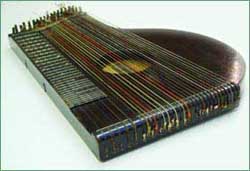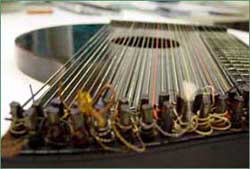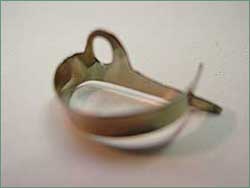 |
"The Zither - From a log to a world hit." In the Mozart opera "Don Juan one piece of music "Horch auf den Klang der Zither" (Listen to the sound of the Zither) is played on a Mandoline. In Goethe's Faust Mephisto throws a lute to the ground with, the words: "The Zither go to pieces! There is nothing to hold on it." The actual concert Zither developed from the Middle Age log. At the begin of the 19th century the Zither virtuoso like the Viennese J. Petzmayer (born 1803 at Zistersdorf, Lower Austria) made Zither music very popular. The Duke Maximilian (Wittelsbach) from Bavaria was very enthusiastic of Petzmayer's performance, so he studied Zither playing. Also his beloved daughter Sissy, later Empress of Austria, played excellent Zither. When she occasionally visited an alp inn she played on a Zither. Another guest - a farmer - gave her for her performance one Gulden. By the way, the farmer didn't know that she was empress of Austria. This one Gulden was the one only money she ever earned in her life by herself. She was very proud about the self earned money. About 1850 N. Weigel introduced the modern tune of the Zither and M. Amberger developed 1862 the concert Zither. The finger board today mostly tuned in the Munich tuning respectively in the normal string tuning with a', a', d', g, c. Anton Karas played in the Viennese tuning which is very different to the Munich kind of strings The finger board is stringed with a', d', g', g, c strings. |
| The Original "Zither" of Anton Karas | |
 |
|
 |
|
| Zither-Ring |
|
Five basses are substituted by five contra basses because these strings are easier to reach on the fingerboard. The accord string g and fis are one octave higher. The proponents of the Munich tuning talking about this manipulation into the quintcircle as a "Defect". The Viennese school are talking about as an "Effect". Even this "Effect" essentially contributed to the success of the "Third Man" and was the reason that the Harry Lime theme, which was not to play on the Munich Zither in this way, become a world hit. Nothing comparable wasn't reached until today by another Zither player. Commendably Freddy Golden, a studied pianist and musician from Enschede, Netherlands, who found the Zither as well on the loft like Anton Karas, performances of modern songs and for excellent jazz improvisation are to play on the Zither.. The further development will be very exciting. Dr.Günter Wittenstein |